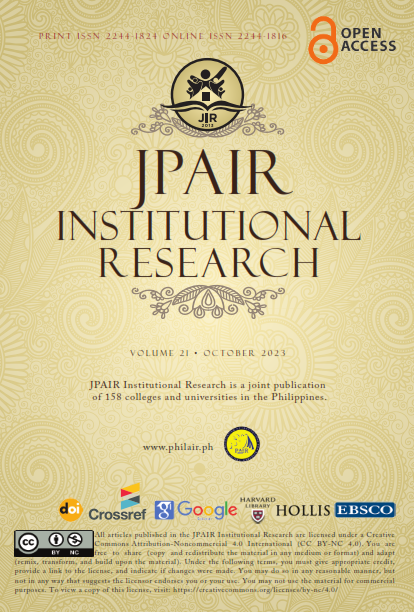Transactional Management, Transformational Leadership, Organizational Culture, and Teaching Competencies of Teachers in Basic Education
DOI:
https://doi.org/10.7719/874Keywords:
teaching competencies, organizational culture,, transformational leadership, transactional management, structural equation modeling, PhilippinesAbstract
There are concerns about teachers’ pedagogical competencies in the Philippines due to reports of poor performance by Filipino students in various academic disciplines. Studies show that teaching has more impact than other factors like services, facilities, and even leadership. Therefore, this study examined the teaching competencies of elementary school teachers, and sought which among transactional management, transformational leadership, and organizational culture are its best predictor/s. Questionnaires, in the form of hard copies and Google Forms, were used as data collection tools after undergoing rigorous scientific testing to ensure accuracy and consistency. Using Raosoft sample size calculator and reliability guidelines (Howard, 2016), this research study gathered information from 479 primary school teachers in two divisions: Gingoog City and Misamis Oriental. They were chosen using a proportionate stratified random technique. As implied by the results, it has been observed that teachers possess remarkable teaching competencies when planning, developing, and achieving desired outcomes. In addition, the teaching competencies of elementary teachers are significantly influenced by the levels of transactional management and transformational leadership exhibited by the school head, as well as the organizational culture they foster. They also demonstrate high confidence in their ability to impact student learning, effectively handle classroom management, actively engage in continuous professional development, and implement effective teaching strategies. The top predictors are cultural strength, achieving goals under organizational culture, and developing and changing under transformational leadership. All these predictors have a positive and direct impact on teaching competencies, which means that when these variables’ levels increase.
References
Acido, J. V., & Caballes, D. G. (2024). Assessing educational progress: A comparative analysis of PISA results (2018 vs. 2022) and HDI correlation in the Philippines.
Allen, C. D., & Penuel, W. R. (2015). Studying teachers’ sensemaking to investigate teachers’ responses to professional development focused on new standards. Journal of teacher education, 66(2), 136-149.https://doi.org/10.1177/0022487114560646
Alvarez, M. D. L. C., & Domenech Rodríguez, M. M. (2020). Cultural competence shifts in multicultural psychology: Online versus face-to-face. Translational Issues in Psychological Science, 6(2), 160.
Downloads
Published
Issue
Section
License
Copyright (c) 2023 Cupid Jones O. Risonar, Nenita I. Prado, Jayson S. Digamon

This work is licensed under a Creative Commons Attribution-NonCommercial 4.0 International License.
Open Access. This article, published by JPAIR Multidisciplinary Research, is licensed under a Creative Commons Attribution-Noncommercial 4.0 International (CC BY-NC 4.0). You are free to share (copy and redistribute the material in any medium or format) and adapt (remix, transform, and build upon the material). Under the following terms, you must give appropriate credit, provide a link to the license, and indicate if changes were made. You may do so in any reasonable manner, but not in any way that suggests the licensor endorses you or your use. You may not use the material for commercial purposes.












